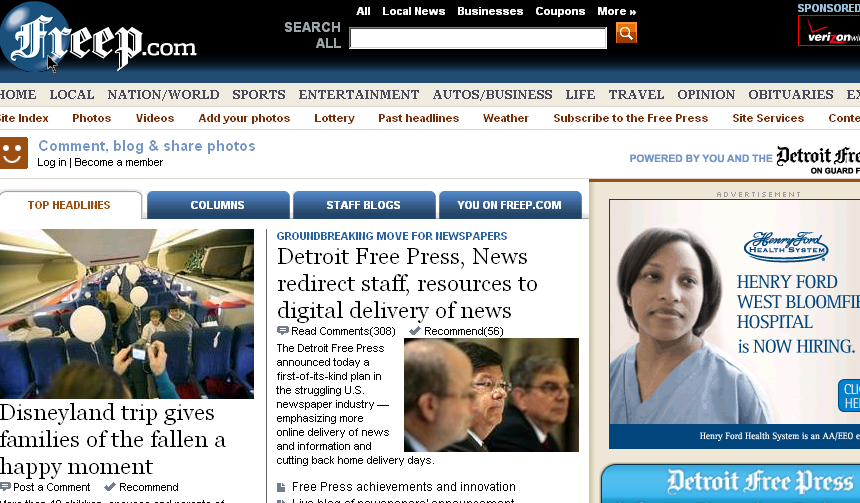The Internet, the last hope of newspapers
Both of Detroit's major daily newspapers cut back home delivery to three days and turn to the Web for most content distribution.

A "bold transformation" is how The Detroit News and The Detroit Free Press are trying to spin their decision to limit home delivery of their newspapers to three days a week.
While both said Tuesday that they will continue to issue traditional newspapers at newsstands seven days a week, they are the first daily newspapers from a major city to cutback home delivery.
"The dynamics of delivering information to audiences has changed forever due to technology," said a jointly released statement from the papers. "The economics of the newspaper business demand change to survive."
The way the press release reads, The Free Press and the News are jumping out ahead of what will soon be the next step in the evolution of newspapers. Wrong, says Alan D. Mutter, a former journalist who is now managing partner of Tapit Partners, a group of information-technology consultants. He says the papers had run out of options and were down to two: Either jump to the Web or close.
"The decision to abandon seven-day home delivery in Detroit was not a bold strategic initiative but a last-ditch effort to save two failing newspapers," Mutter wrote on his blog Newsosaur.
Mutter quoted an unnamed former executive from Gannett, parent company of the Free Press, who claimed to have knowledge of management discussions from last summer. "They cut all they could," Mutter's source told him. "We saw the papers as continuing to deteriorate--and that was before Lehman Brothers (and the economy collapsed)."
By all indications, the Detroit papers, and The Christian Science Monitor, which announced that it planned to stop printing papers on a daily basis starting in April, are trying to save themselves from reader apathy and disappearing ad revenue by migrating to the Web.
After reading the news about the Detroit papers, online of course, I remembered the day a computer with Web access was first brought to the office of one of my editors at The Los Angeles Times--a newspaper whose parent company, The Tribune Co., filed for bankruptcy earlier this month. That was more than 10 years ago. Even then there were people telling my editor and the rest of the newspaper industry that the Internet would one day drastically alter the way people obtained information. My editor didn't believe it and plenty of others in the business didn't either.
Now, the only hope for newspapers is if they can make a business out of online publishing. Nothing is for certain.
Sitting in front of his new computer that day many years ago, my editor appeared annoyed and told me, "This is just another fad, Greg."

